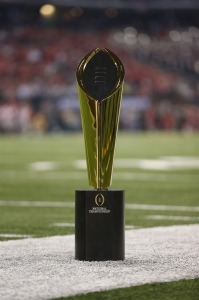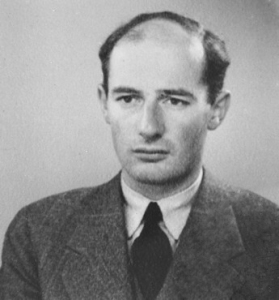Randy Lewis's Blog, page 2
January 20, 2015
Is Winning the Only Criteria of Greatness?
 The first National college football championship to be decided on the gridiron was recently completed in Jerry Jones’ AT&T Stadium this week. In a great game—unless you are an Oregon Duck fan—Ohio State prevailed in the new four team tournament. The competing teams were selected by an impartial committee seeking to identify the four best teams in America.
The first National college football championship to be decided on the gridiron was recently completed in Jerry Jones’ AT&T Stadium this week. In a great game—unless you are an Oregon Duck fan—Ohio State prevailed in the new four team tournament. The competing teams were selected by an impartial committee seeking to identify the four best teams in America.
For decades, football fans have clamored for a playoff system that allows the best teams at the end of the year to go head-to-head with a single winner emerging to take the title. Prior to this year, fans of multiple schools could claim that distinction of being the best in America, especially since many of the top teams did not play against each other. As a consequence, fans of multiple schools could spend the off-season, claiming to be #1 with no evidence to dispute their claim. I suspect that many fans will grow to regret the new system with a single clear-cut winner. Whether fans of a team like TCU—which was not selected to participate in the tournament—or a member of the Alabama Tide, the old system provided for a number of different champions —different bowls and different polls—and gave multiple schools bragging rights to the mythical title. As a fan, I think I would rather have the old system than the new.
Biologists and sociologists say that competition is the natural order of living things, from basic cells to complex biological entities like humans. Winning when competing for resources such as water, food, mates, and prestige can be the difference in survival. In the real world, competition can lead to complete annihilation and extinction of rivals. Competition is usually the process by which limited resources are allocated—winners reap the rewards and losers pay the price.
As a businessman, I like competition. With reasonable protection against discrimination and exploitation, striving to be the best, the biggest, and baddest can benefit everyone. At the same time, rivalry can have negative results including deaths, injuries, and damaged psyches. In business, extreme competition is usually accompanied by high stress, long work hours, abusive working relationships, and abominable working conditions. That is why rules are important to manage the behavior of competitors, as well as the relationships and activities within the rival firms. I want to beat my competitors in the marketplace, not destroy their companies or employees.
In my view, not every activity is or should be competitive. Do I need to be the best guitar player to enjoy music? Do I need to win some mythical championship to experience the pleasure of a game like baseball, football, or other sports? Do I need a trophy to justify every activity or effort? The rational answer is, “Of course, I don’t.”
It seems that competition provides greatest benefits when individuals compete against themselves, not their associates or rivals. Golf—a sport I’ve played for thirty years—is a good example of how competition can be managed to produce the most useful result. My neighbor, blessed with great hand-eye coordination and the beneficiary of years of childhood gold lessons, is a scratch golfer while I struggle to break 100. Nevertheless, we enjoy playing together, and we root for another on the course; I hope he breaks par, and he hopes I’ve brought enough golf balls to finish the round. While his score is always lower than mine, we enjoy our outings, and each of us strives to be better than we began the day. The fact that his score is lower than mine does not diminish my enjoyment of the game, the effort I put into practice or playing, or my score.
Whether running a business or living a life, balance and perspective are extremely important. Winning at all costs is rarely, if ever justified, whether in business or play. A wise person prioritizes goals in light of his specific abilities and deficiencies, and focuses on his outcome, not how he might compare with someone else. Remember that an alternative to competition is cooperation, a much more difficult relationship to establish and maintain, but immeasurably more satisfying to the individuals involved and likely to produce superior results.
January 17, 2015
The Angels Among Us
 In the latter months of 1944, Hitler was determined to implement his “Final Solution”, especially for the Jews in Hungary. In April of that year, Hitler ordered the occupation of Hungary and initiated mass deportation of Jews to the extermination camps in Poland. Over the following four months, more than 400,000 Jews were murdered at the Auschwitz-Birkenau concentration camp. At the time, the world was unaware of the extent of mass killings of those the Nazis deemed “undesirables”, but knew of the Hungarian persecution of Jews. At the time, Winston Churchill declared the persecution in Hungary “the greatest and most horrible crime ever committed in the whole history of the world…”
In the latter months of 1944, Hitler was determined to implement his “Final Solution”, especially for the Jews in Hungary. In April of that year, Hitler ordered the occupation of Hungary and initiated mass deportation of Jews to the extermination camps in Poland. Over the following four months, more than 400,000 Jews were murdered at the Auschwitz-Birkenau concentration camp. At the time, the world was unaware of the extent of mass killings of those the Nazis deemed “undesirables”, but knew of the Hungarian persecution of Jews. At the time, Winston Churchill declared the persecution in Hungary “the greatest and most horrible crime ever committed in the whole history of the world…”
Directed by Adolph Eichmann, Chief of the Jewish Office of the Gestapo, the Germans rounded up and began deporting thousands of Jews to the gas chambers. Forced marches and trains of 40 and 8 boxcars loaded with starving men, women, and children transferred Jews from Budapest at the rate of 12,000 victims daily. Despite worldwide distress, other nations were powerless to stop the slaughter. America and Great Britain were fighting on two fronts—Europe and Japan—and their ally, Russia, was ambivalent about the persecution, sharing much of the prejudices of the Nazis for Jews. In the midst of the cruelty and chaos, a young Swedish diplomat stepped forward to challenge the system, risking his life to save others.
The history books are filled with stories of such heroes, most of whom are forgotten with the passage of time. One such man was Raoul Wallenberg, the son of a wealthy Swedish college professor and the grandson of a Swedish diplomat. Born near Stockholm in 1912, Wallenberg graduated from the University of Michigan with a degree in architecture, spending his summers and vacations hitchhiking across the United States. When his American education was deemed unacceptable to practice architecture in Sweden, he worked briefly as a construction materials salesman in South Africa, then as a banker with the Holland Bank in Haifa. In 1936, Wallenberg joined the Central European Trading Company, a Swedish export-import firm owned by family friend and Hungarian Jew, Kalman Lauer.
Life in Sweden during the 1930s, like other European and Scandinavian countries, changed with the build-up of German military power and the rampant spread of nationalism, especially fascism and the more radical Nazism. Within two years after joining the firm, Wallenberg’s boss and mentor, Lauer, was unable to travel freely due to his ethnicity, so Wallenberg became the company’s primary representative in Hungary.
When war between the European nations was declared in 1939 following Germany’s attack on Poland, Sweden declared its neutrality and non-belligerent status. The Swedish Prime Minister, declaring their intended neutrality, said, “Friendly with all other nations and strongly linked to our neighbors, we look on no one as our enemy. There is no place in the thoughts of our people for aggression against any other country, and we note with gratitude, the assurances from others that they have no wish to disturb our peace, our freedom, or our independence. ” Doing business with both sides enabled Wallenburg to learn the intricacies of Nazi administration and bureaucracy, knowledge that was critical to the role he later played in saving Hungarian Jews.
Wallenberg was 32 years-old, an attractive bachelor with the connections to enjoy the benefits of the family wealth, when he was appointed first secretary of the Swedish delegation in Budapest in June 1944. With the clear mission to save as many Jews as possible, he wasted no time, establishing more than 30 “Swedish Houses” as refuges for Jews within the city under control of the Swedish embassy. He also negotiated a protective pass which the Nazis agreed to recognize that ultimately saved thousands. The young Swede quickly became an irritant to the Hungarian Nazis, sometimes halting the Auschwitz-bound trains to issue protective passes to those inside, despite being fired upon by German soldiers. He bribed German officials who were willing and threatened others with the prospect of war crimes. Of the 120,000 Jews surviving in Hungary, many believe the diplomat was responsible for savings at least 100,000.
Four days after the Soviets liberated Hungary—January 17, today’s date seventy years before—Wallenberg and his driver, Vilmos Langfelder, disappeared on his way to a meeting with the Russian military at Debrecen, Poland. Neither he nor his driver were ever seen again. Two months later on March 8, the Soviets announced that the two men had been killed by Nazi sympathizers or fleeing Gestapo soldiers. However, their bodies were never found. At various times since, the Soviets have claimed that Wallenberg was arrested on espionage charges and imprisoned at the Lubyanka Prison in Moscow and was either executed or died of a heart attack in 1947. It is doubtful that the truth will ever be known.
Raoul Wallenberg is a testament that good men and women always appear, even in times of the greatest human depravity and desperation. At times, their acts are public and recognized like Wallenberg. Most, however, live their lives with grace and courage unrecognized by anyone other than the beneficiaries of their deeds. We see examples around us every day — the single mother working two jobs to keep her family together, neighbors caring for neighbors, volunteers at schools and nursing homes—that make life easier, happier, and more bearable in difficult times. Thank God for those angels among us.
Randy Lewis's Blog
- Randy Lewis's profile
- 2 followers



